Senegal, part 1 (of 3)
recording of some birds in Africa:
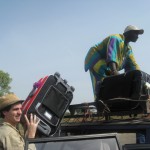
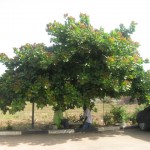

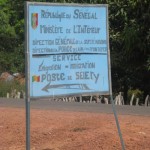


Crossing from Gambia to Senegal
I am writing from a tiny village in Senegal. Life here is very primitive. Mark and I are staying in a bungalow with a walkway to the beach. No electricity. No hot water. No soap (fortunately I thought to bring a bar of soap), no towels provided at this facility. We use candles for light. Luckily I brought a towel, a flashlight and extra batteries, because it is very dark at night right now, with only a sliver of a moon. Our room has a bed (a thick, double bed size piece of foam placed over a cement base), sheets, 2 pillows and a mosquito net. At 15 Euros a night the rooms were so inexpensive that we sprung for 2 adjacent rooms so our stuff doesn’t get in each others’ way.
Nothing here is comfortable. Nada. I am sitting on a hard wooden chair outside my hut. I use our pillows to sit on, one for my butt one for my back. The room has no closets but there’s a corner with a wooden rod to fling things over. Another corner has 3 shelves. Basic but functional. We each have 2 candle holders, and we’re provided with an endless supply of candles.
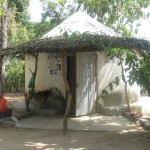

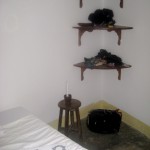
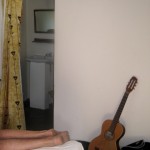
Typical round hut, mosquito net, 2 interior shots of our rooms
Our immediate garden outside is lush and filled with exotic birds, aromas, tactile sensations.

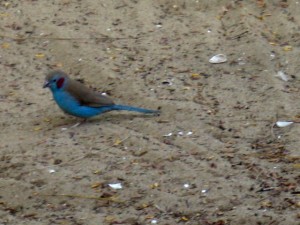

My hut looks out onto this garden, I love this blue bird with his red ears, a shot looking out from my bathroom window.
This village is not for the luxury tourist, in fact there are official travel warnings on government websites that this region could be dangerous, mostly along the border from Gambia to Senegal. In fact we were stopped about 5 times coming into Senegal from Gambia and handed over money to a series of corrupt officials, of which Mark was able to sneak a photo of one:
So far, many clichès about Africa are true – there seems to always be people banging on drums somewhere nearby, no matter where we go. Of course, this is partly because all week there has been a charming Abene music festival going on. Tonight is the last night.
Mark has made friends with a man from a nearby village who is giving him his second Mandinga lesson as I write this. Mark seems keen to learn the basics while he is here, because Africa might become our new winter getaway. It is torrid here, just as one would expect. Africa is so big – we’ll do some research and go somewhere else next winter.
On this trip Mark brought his guitar and I brought my melodica, piffero, small shakers. We have been jamming with different combinations of drummers and singers we meet and it is amazing how music brings us all together. The highlight of one jam was when we all settled on a groove that the Africans especially liked. They all knew the words to it. At one point 5 or 6 guys jumped up and started doing a choreographed line dance while singing about Abene. It was an amazing moment and I could tell from the look on Mark’s face that he was filled with joy as well.
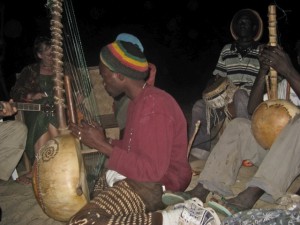
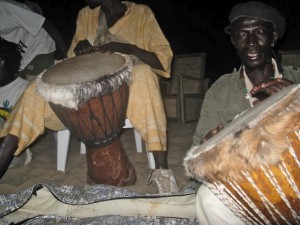
Our new musician friends who we jam with every day.
If I were not a musician I don’t think I would care for this tiny village of Abene. There is a heavy vibe of sex tourism, and I am constantly approached by very tall, ivory black men offering their services to be “my boy”. (“I’ll do anything you ask me, Ma’m, anything.”) I find this aspect very upsetting, but I suppose these people are extremely poor and obviously they appeal to many white European women. I find all this degrading to both, but I guess to each his own. Who am I to judge? There also seems to be an innocence to the sex scene as a good percentage of the romantic trysts that start here seem to develop into full relationships and marriages where the European woman decides to stay and make Senegal her home or the man moves to Europe with his new partner.
The beach of Abene is pristine:
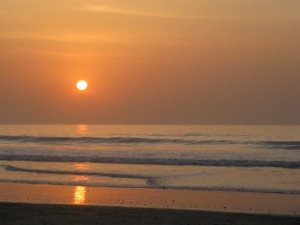
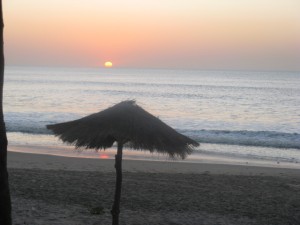
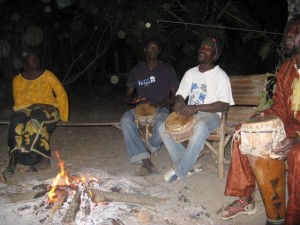
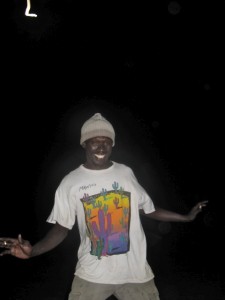
Jamming by the campfire, “Aha” my favorite musical cohort jumps up and starts dancing.
We spent New Years Eve playing with our favorite new musician friends, who have a basic shack on the beach that serves coffee, tea, fish, ganja, music. They love us because although there are hundreds of percussionists and singers here, its unusual to find any of them with a melodic instrument. They taught us a few African songs in which they sing the verse twice, then I have to play the melody twice, then they gleefully jump back in with their part. Meanwhile Mark plays groovy chords to hold it all together – the songs all have a verse and a chorus over and over again. Each song lasts about 45 minutes. This is good – after playing my part for about 20 minutes I start getting more experimental musically, mainly making sure to finish the last half of my given melody on my second time through so they can happily come back in with their parts. They seem melody starved and are also very impressed by Mark’s guitar chops. As 2008 became 2009 we were playing a chain gang song they taught us. which was way cool for me because I wasn’t expected to play the structured song anymore, I could just play the blues … Mark too … and boy did that feel good!
After playing that song for about 45 minutes there was a pause and one of them says to me ” you teach us something” so I taught them an old classic SKANKSTERS (my reggae band in the 80`s) song called “I Feel Rude”. This was the hit of the night. I had them all singing
“I feel rude
I feel rude tonight
I feel rude
I feel rude tonight
Come on and rude
Come on and rude with me
Come on and rude
Come on and rude with me
Rude it up rude it up 2X
Rude it down 2X
Rude, all around
Be obnoxious
drunk and loud
grab a stranger and rude him out
repeat whole song ad nauseum
(there are more words but I didn’t want to confuse them)
This is me and me SKANKSTERS cohort Arlo Zoos singing I FEEL RUDE back in the 90’s
There is an exhilarating tapestry of pure sound in a town like this in Africa, where no one on our end of the village has electricity. Even the funky nightmarish internet place at the beginning of the village only is allowed to have electricity between certain hours every day. Everything in this country is intricately and atavistically divided. There are actually two rickety internet places “competing” with each other, and only three sheds away from each other. They compete to play the loudest music; one playing reggae, the other hip hop, with the hut in between the two internet places playing Arabic music. The result is high volume cacophony, which becomes part of the strangely tactile experience of filling Partners In Rhyme orders in Abene. Its very slow, frustrating, exasperating even given the heat, but we manage to make it there every few days to fill orders and recharge my laptop and Mark’s iPhone.
We give our business to the internet shop recently opened by a French woman resident named Laurie who is married to an African musician who is presently performing in England. She is somehow mistrusted and given a hard time because she is a white woman and the other internet place was there first. Laurie is the mother of a 3 year old son born here in Africa. She lives here, is trying to help the village, is the one responsible for giving this Abene music festival a website. She has noble intentions of teaching people in the village first how to type, then how to browse the internet for information, not just games. Most importantly for tourists like us, she speaks English.
As sound designers we are in heaven. There are no generator noises, few cars, only the sound of the ocean surf, the incessant drums and birds. It is when the drums stop that we get the best sounds, the true sounds of Africa with its many exotic birds, insects, frogs, lizards and wild cats, goats , dogs et al. Pure sound is exhilarating.
Mark really likes his new friend El Bari, the one who is teaching him Mandinga. I met him first on the beach when I was toodling on my melodica to drummers that were playing for the Catalan dancers as they had their dance class near the ocean surf. El Bari was singing to my melodica when Mark arrived with his guitar and we started to jam. El Bari has an exceptional voice and a great sense of melody. Mark and El Bari seemed to hit it off so I left to go hang out in our shack.
On the beach Mark was telling El Bari the two Mandinga words he learned from some Gambian friends he made the day before and they got talking about the language. Mark mentioned he was keen on learning it and EL Bari said he would get a notebook and a pen and write out a lesson for Mark and that if Mark wanted to walk to his his hut in Nye Frau the next day they could have lunch and a lesson.
Mark gave El Bari some francos and thought to himself ‘If he shows up tomorrow with a notebook and a pen and a written lesson I will follow him to his house and have lunch and a Mandinga lesson’. El Bari did indeed show up the next day with the book and the lesson and the pen so Mark started out on his journey with El Bari.
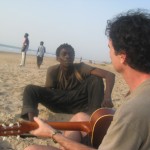
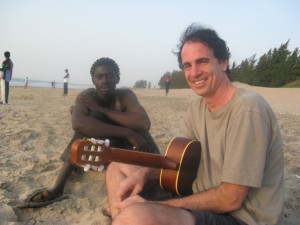
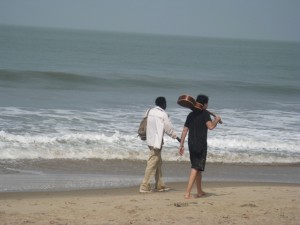
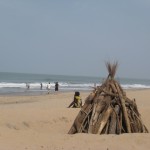
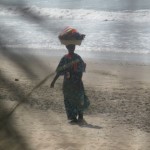
El Bari and Mark walking to Gambia for a Mandinga lesson
They walked along the beach for a long time and Mark, after asking a few questions, realized he was in for a very very long walk. They were basically walking to Gambia and Mark in his usual unprepared style was barefoot. They finally arrived at the hut of El Bari in the village of Niafrang. It was a circular hut like most huts here with windows and doors covered with pieces of cloth only. There was a campfire, a bunch of chickens, lots of trees and shade, lots of pots and pans and cooking utensils lying around.
Mark sat down and El Bari asked for a few Francos so he could go get something for the lunch they were about prepare. He left and Mark started practicing his flamenco guitar chops next to the campfire. A couple of local men wandered through the camp occasionally saying ‘se va’ apparently not curious at all as to why there was a white man playing flamenco guitar in the middle of their cooking area.
When El Bari returned he started preparing the food and Mark asked if he could help and El Bari really gleefully said ‘yes, you can chop the onions’ and handed him the top of a pot as a cutting board and a large rusty but very sharp machete with a bunch of mysterious symbols engraved on it. Mark sliced the onions with the machete, then the potatoes, then El Bari seemed to get the notion that Mark knew what he was doing so Mark was suddenly in charge of cooking the whole lunch. El Bari built the fire and then put a large wrought iron pan on the flames and pulled out a little bag of cooking oil that he purchased at the store. Once the oil was hot Mark cooked the sliced potatoes until they were golden brown on both sides, then sauteed the onions, then cooked a four egg omelette. When it was done Mark and El Bari ate off the same plate with much gusto. Afterwards El Bari confided in Mark that it was the best meal he had in a long time and that he felt very very good.
They then proceeded to the Mandinga lesson. Mark noticed how genuinely intelligent his new friend was. El Bari had a tough life, his parents died when he was just 2 year old and he was brought up by his grandmother. El Bari often goes without food for 2 or 3 days and works the tourists like us for whatever he can. But somewhere along the way he received a good education, probably due to the sacrifices his grandmother had to make for him. He speaks very good English, his handwriting is much more legible than Mark´s and he is constantly expounding on deep philosophical ideas. He is a very good language teacher and understands what it takes to learn a language.
After the lesson Mark and El Bari head back to Abene and Mark finds me locked in my bedroom crying with fear that he had been kidnapped by Gambian soldiers. He was gone almost 8 hours and I was really, really worried.
Mark never wanders too far from me after this. With guitar and melodica when we set out we create some of the most quasi un-imaginable memories. Last night we literally played our way out of a potentially uncomfortable situation. At the insistence of a rather pushy African drunk man, we ended up walking with our instruments to the Belle Etoile hotel with our friends Serge and Yousef. It is down a long dusty dirt road surrounded by huge Baobab trees and little huts and compounds. The road was narrow and unlit. We had to stand with our backs to the trees when a car would pass by. We finally came upon a big gate leading into a compound with bouncers standing around. Serge was deep in conversation with them I guess attempting to get us in free as reggae music is blasting from the sound system inside. I complain to one of the bouncers that it is just a DJ, where´s the band? In the meantime Mark has started playing the chord progression to the reggae music playing inside and starts marching away from the gate. I pull out my melodica and follow suit by playing a strange arabic melody over Mark´s riff. We fall into step with each other and go marching back up the dirt road, starting a strange parade. Our 2 friends see what we are doing and catch up with us to form the beginnings of a dancing parade….by the time we reach the end of the dusty road we have a happy, bouncy group following us.
Serge accompanies us half way home – he wants to get a goat head sandwich from the goat dibiterie. Mark had been completely curious about the Goat Shack or “The Dibiteri” since our very first day arriving in Abene when Marta pointed it out as we were walking past saying “that’s where they grill goat meat”. It’s just a small concrete block of a place with one window and one door. There’s one table inside for eating and one for the chopping up of goats. There’s a fresh goat carcass hanging in the window every night. During our impromptu parade Mark was surprised that Serge ended up leading us to this place. We went inside and Serge pointed to a pile of white, wrinkly goat intestines that were filled with something brown inside, I assumed it was goat shit. This is where I shut myself off, didn’t let it get to me, waited outside on the stoop, where I continued to play my melodica. Mark thought he was pointing it out to him because of how weird it was that they would leave this mess out in view of people who were actually eating normal goat meat but it turns out he was placing an order for goat intestines. Mark was astonished. The man at the counter chopped up a good portion of the intestines, dumped them in a piece of newspaper and covered them with lettuce, tomatoes and hot sauce. Serge and Mark went to sit outside on the bench where Serge borrowed my flashlight so he could see what he was eating. It finally dawned on Mark that this was ‘drunk food’, like in the US when you go get a cheeseburger and fries at 2AM, or in London when you go get a curry or a kabab. Here you get a plate of goat intestines and hot sauce after a night of drinking quarts of cheap warm beer.
Serge offered Mark some which reminded Mark of the many strange things he has eaten during his travels and hadn’t died yet, so he went ahead gave it a go. It was chewy and the hot sauce really saved it as there wasn’t much flavor. It didn’t taste like goat shit either, thank God. He even had a few more bites before we left Serge there to go home for the night.
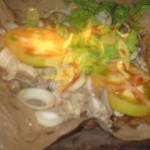
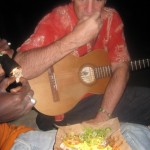
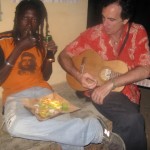
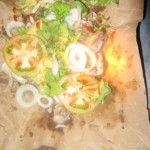
Mark and Serge sharing a goat intestine dish
It reminded us of the time in a small town in South Vietnam when Mark drank “wine” from a jar that had a 15 foot python floating in it. Mark is pretty sure what he drank was straight snake-flavored formaldehyde as he felt very strange afterwards and began to have mild hallucinations on the way home. Goat intestines had no discernible effect on him though.
As we walked down the last dusty lane leading to our round home 3 white dogs appeared out of nowhere, like ghost dingos. No aggression, just alert. One of then grazed my hand as I walked by, just a light sniff, not at all menacing, just checking me out. As we walked to our hut I ask Mark, “Do you think those were real dogs?” He says, , “No I was thinking those were the 3 dog night, like in a dream”.
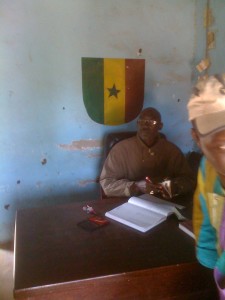
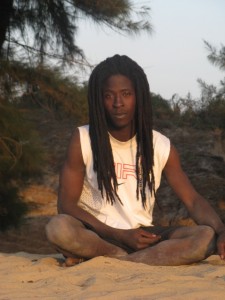
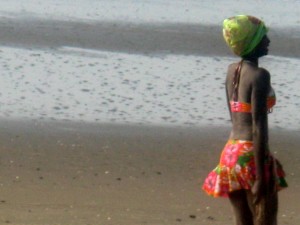


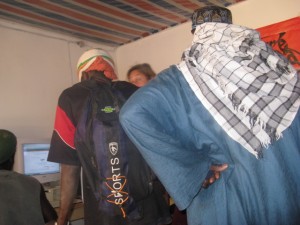
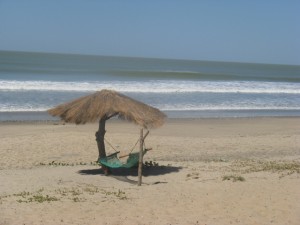
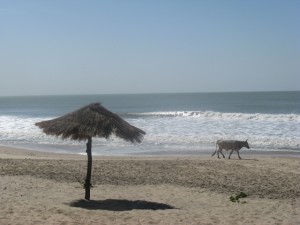


Recent Comments